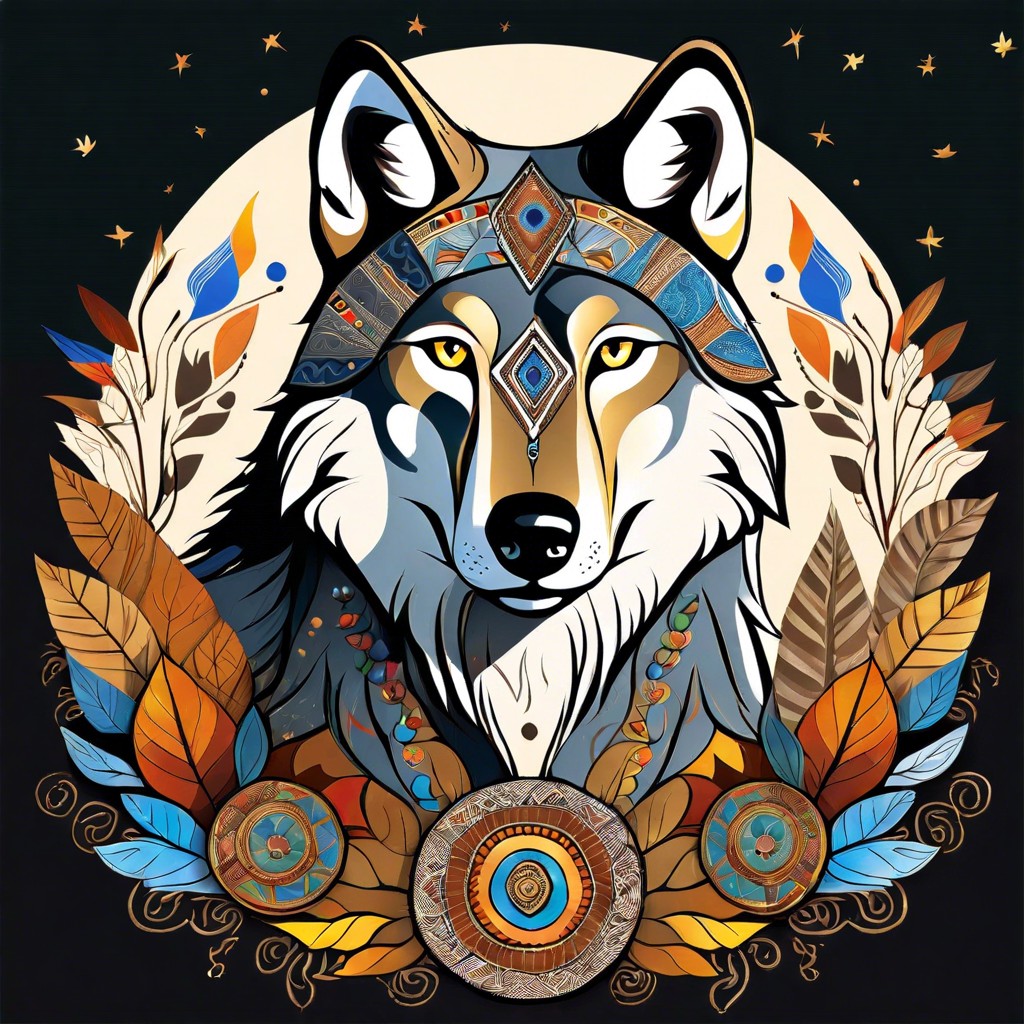Discover the profound symbolism and spiritual meanings behind the wolf as a spirit animal and how it can guide you through life’s journeys.
Delve into the fascinating world of the wolf spirit animal, a powerful symbol of loyalty, perseverance, and courage embraced across various cultures. Uncover how embodying the wolf’s instincts, adaptability, and unity can transform your life, enhance your communication, and provide spiritual guidance through life’s many changes.
Key takeaways:
- Wolf symbolizes loyalty, perseverance, and courage across cultures.
- Embrace instincts, adaptability, and unity like wolves in social settings.
- Learn clear communication, loyalty, and teamwork from wolf behavior.
- Seek spiritual guidance, transformation, and support in life changes.
- Connect with wolf spirit through nature, meditation, study, and rituals.
Symbolism of the Wolf in Various Cultures

In many Native American tribes, the wolf is revered as a powerful totem representing loyalty, perseverance, and connection to the natural world. The Cherokees tell tales of the wolf as a spiritual guide that imparts wisdom and protection.
In Norse mythology, wolves are prominent figures, portrayed both as fierce beasts and mystical symbols. Fenrir, the monstrous wolf, embodies chaos and change, whereas the wolves Geri and Freki are loyal companions to the god Odin, symbolizing strength and companionship.
In East Asian cultures, the wolf often represents courage and guardianship. For example, in Japanese folklore, the wolf is seen as a protector of the forests and villages, guiding lost travelers back to safety.
In Celtic traditions, wolves are honored as symbols of transformation and the wild spirit, associated with lunar deities and often appearing in myths as guides through mystical realms.
These diverse cultural interpretations highlight the wolf’s multifaceted symbolism, making it a significant and versatile spirit animal.
Instinct and Intuition
Wolves are often admired for their keen instincts and sharp intuition. They navigate their environment with an acute sense of awareness, using their finely tuned senses to find food, avoid danger, and care for their pack.
One key aspect of wolf intuition is their ability to sense changes in their surroundings. Wolves pay close attention to subtle cues, enabling them to respond quickly and adapt. This teaches us the value of staying alert and trusting our gut feelings.
Wolves also rely heavily on their instincts to maintain pack harmony. Their social structure is a balance between independence and cooperation, guided by an innate understanding of each pack member’s role. This can remind us of the importance of knowing our strengths and working harmoniously with others.
In our personal and spiritual lives, embodying the wolf’s instinctual nature can lead to deeper self-awareness and more meaningful connections. Listening to our inner voice and observing the world around us with heightened awareness can help us navigate challenges and opportunities with greater clarity.
Communication and Social Connections
Wolves are known for their strong social bonds and intricate communication skills. They live in packs, working together harmoniously for the benefit of the group.
Their howls, body language, and facial expressions are forms of communication that convey everything from warnings to alerts about prey. This teaches the importance of clear and honest communication in our own lives.
By observing wolves, we learn the value of loyalty and teamwork. Each member of the pack has a role that contributes to the survival and success of the group. This reminds us to appreciate and support those in our own communities and to recognize the strength found in unity.
Moreover, wolves’ ability to communicate effectively emphasizes the need for expressing ourselves transparently, respecting the voices of others, and fostering healthy, supportive relationships.
Spiritual Guidance and Transformation
The wolf is often seen as a powerful guide through life’s transitions. They are keenly aware of the unseen, picking up on subtle energies and guiding us when we feel lost.
Wolves can symbolize the journey of self-discovery. They encourage us to trust our instincts and embrace the changes that come our way. These transformations may be challenging, but the wolf spirit reassures us that we have the strength to navigate them.
To connect with this energy, meditate on the wolf during times of change. Reflect on the qualities of resilience, adaptability, and inner strength. Allow these traits to guide you through your own spiritual transformations.
Finally, remember the importance of the pack mindset. While personal growth is crucial, so is the support of a community. The wolf teaches us that transformation is not a solitary endeavor; it is intertwined with the bonds we share with others.
How to Connect With and Honor the Wolf Spirit
Spend time in nature, especially in forests or mountains, where wolves naturally dwell. This helps create a connection with their primal energy.
Meditate on the wolf. Visualize its strength, freedom, and loyalty. Let these qualities inspire and guide you in your daily life.
Study the behavior of wolves. Understanding their pack mentality, communication styles, and survival skills can offer insights into their spiritual significance.
Keep symbols of the wolf around your home. This can be through art, figurines, or even images that resonate with you. They serve as constant reminders of the wolf’s spirit.
Pay attention to your instincts and intuition. Honor these inner voices as the wolf does. Trusting them strengthens your inner guidance.
Offer gratitude and respect to the wolf in your prayers or spiritual practices. Acknowledging their influence in your life deepens your spiritual bond.
Participate in or create rituals that involve the wolf spirit. This could include guided meditations, full moon ceremonies, or storytelling sessions about the wolf’s myths and legends.





